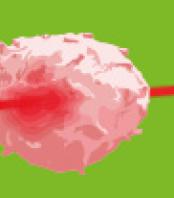Apoptosis is an essential process for normal tissue development and homeostasis by which cells undergo timely programmed cell death. Aberrations in apoptotic signaling are implicated in a range of human pathologies including cancer, autoimmune disease and neurodegeneration. Induction of apoptosis leads, in most cases, to the activation of caspases (cysteinyl aspartate proteinases) and plasma membrane alterations. The activation of caspase-3 or caspase-7 results in the irreversible commitment of the cell to apoptotic death, and is considered a reliable marker for apoptosis. The regulated loss of plasma membrane phosphatidylserine (PS) symmetry is also a classical marker of apoptosis. Dying cells trigger the translocation of the normally inward-facing PS to the cellular surface, allowing for early phagocytic recognition of the dying cell by surrounding phagocytes.
The IncuCyte Annexin V Reagents are highly-selective phosphatidylserine (PS) cyanine fluorescent dyes. Specially formulated, these reagents are ideally suited for real time measurements of apoptosis in living cultures. They are validated for use with the IncuCyte ZOOM live cell analysis system and employ simple mix-and-read protocols. Addition of the IncuCyte Annexin V Reagents to normal healthy cells is non-perturbing to cell growth and morphology and yields little or no intrinsic fluorescent signal. Once cells become apoptotic plasma membrane PS asymmetry is lost. PS exposure on the extracellular surface enables binding of the IncuCyte Annexin V Reagent resulting in a bright and photostable fluorescent signal. With the IncuCyte ZOOM integrated analysis software fluorescent apoptotic cells can be quantified and background fluorescence minimized.
IncuCyte Annexin V Reagents enable real-time evaluation of PS exposure in response to pharmacological agents and/or genetic and environmental factors. Furthermore, the IncuCyte Annexin V Reagents can be combined with the IncuCyte ZOOM confluence metric, IncuCyte Caspase 3/7 Reagent, IncuCyte NucLight nuclear labeling reagents or IncuCyte Cytotox Reagents for multiplexed measurements of apoptosis, cell proliferation or cytotoxicity in every assay well.




































